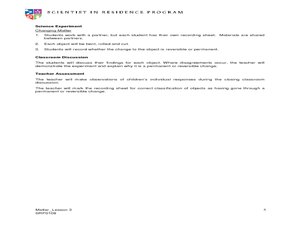Curated OER
Friction
An excellent presentation provides a thorough description of what friction is, how it works, what it's uses are, and how friction can be reduced. Some excellent discussion should follow this PowerPoint in your science class.
Growing Minds
Lettuce Exploration
Kathy Henderson’s book And the Good Brown Earth introduces the class to how a vegetables grows and changes over time. They use different types of lettuce to do a close study of this quick-growing vegetable. Learners consider the look,...
Curated OER
Our Class Woodlice
An experiment which determines the preferred habitat of wood lices's is the focus of this presentation. The woodlice are placed in a container that has four different environments, and each group of learners predicts which one they will...
Curated OER
Impact of Inventors
Students examine the impact of inventors on our world. In this science activity, students are given a time line of the invention of familiar objects. Students then evaluate some kid inventors and decide if they would make investments...
Curated OER
Sampling Rocks
Students collect and sort rocks based on visible characteristics. In this statistics lesson, students determine adequate sample size and categorize rocks based on characteristics. The book Everybody Needs a Rock is read to discuss the...
Curated OER
Look At Those Leaves!
Students collect, measure and classify leaves. In this inquiry-based sorting and classifying lesson, students look at various types of leaves they have collected and measure them using a standard unit of measurement. Next, they relate...
Curated OER
Water and Ice
Learners observe and discuss what happens when water turns to ice and when ice turns into water. In this freezing and melting lesson plan, students observe ice and water and complete hands on activities that change their properties.
Curated OER
Hatching Chickens
Students observe how chickens hatch. In this life cycles lesson, students read the book Hatching Eggs: A Step by Step Guide and use an incubator to hatch the eggs. Students observe the chicks hatching and take care of the chicks by...
Curated OER
What Do You Know About Reptiles?
Introduce reptiles to your class. Each slide provides a list of basic characteristics of snakes, lizards, crocodilians, turtles, tortoises, and tuataras. The last slide provides learners with the titles of a few books they can read if...
Curated OER
Earthworms
Investigate the wonders of worms, earthworms to be precise. This presentation is perfect prior to studying earthworms in class. It provides basic information about their habitat, life cycle, predators, and what they like to eat.
Curated OER
Heating and Cooling Materials
When an object is heated or cooled, a change occurs. Learners will work through this presentation and decide whether or not the changes are reversible. They learn about heating and cooling, then assess changes that have taken place. This...
Curated OER
Interdependence and Adaptation
Find out how camels and polar bears are each perfectly suited to their environments because of their physical adaptations. Several key features of each animal are discussed along with how those features work in their specific...
Curated OER
Changes in Heat
A thorough PowerPoint provides information related to changes in heat. The contrast between day and night temperatures is included. The concepts of boiling and freezing are also covered. Insulators and conductors are presented as well.
Curated OER
Clean, Green Power
Students explore and discuss alternative energy sources, and identify disadvantages of current fossil fuels.
Curated OER
The Four Seasons
In spring the flowers bloom, summer is hot, fall is full of colorful leaves, and winter is cold and snowy. If this sounds like your area of the country, then this presentation would be great for helping you describe each season and its...
Curated OER
Physical Changes to Matter
Pupils explore matter by conducting an in-class experiment. They experiment with water's various forms by melting and freezing water, identifying its new shape. These observations are recorded to supplement later discussion. They also...

















